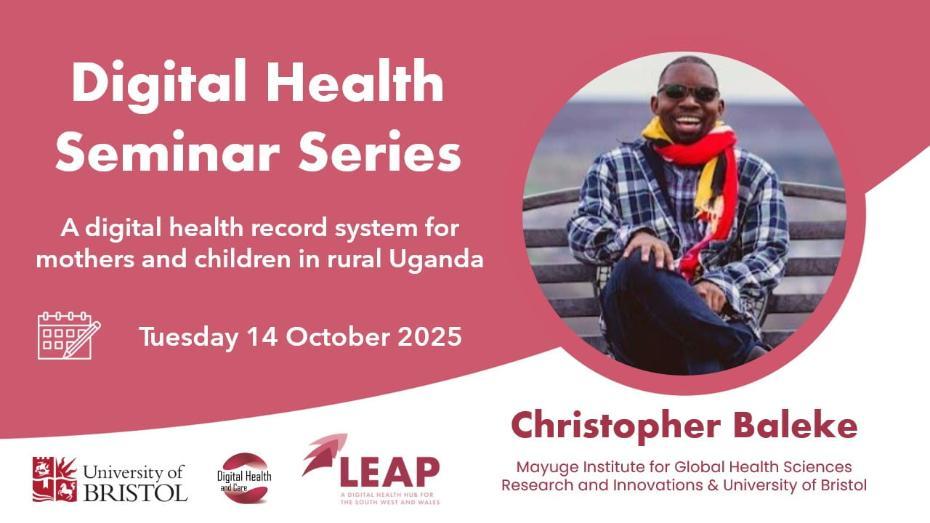Christopher Baleke
Christopher Baleke, Mayuge Institute for Global Health Sciences Research and Innovations
Topic: Developing a Digital Maternal and Child Health record system for a Linked Birth Cohort in Rural Uganda: A call for support.
Location: In Person 1.7S Seminar Room 2, Geographical Sciences (University of Bristol only) & Online (TicketTailor)
Date: October 14th, 2025 14:00-15:00 GMT
Abstract: Maternal and child health (MCH) challenges remain a global priority, with adverse pregnancy outcomes (APOs) including preterm birth, gestational diabetes, gestational hypertension, and preeclampsia posing serious risks to both mothers and infants. These complications contribute heavily to maternal and neonatal mortality and increase lifetime risks of chronic disease. Although progress has been made in many high-income settings, APOs and preventable maternal and child deaths remain disproportionately high in sub-Saharan Africa. In Uganda despite improvements, maternal mortality remains high at 336 per 100,000 live births, with neonatal mortality at 22 and under-five mortality at 52 per 1,000 (UDHS, 2022).
Digital health tools offer a pathway to address these gaps. Use of OpenMRS in HIV care in Uganda and Rwanda, digital immunization registries in Ghana, and maternal health monitoring in Malawi demonstrate that well-designed electronic systems can improve patient tracking, data quality, and research capacity. However, evidence also shows that digital health interventions succeed only when developed with users and communities through co-design.
Our ongoing medical records reviews at Mayuge Health Centre IV and St. Francis Hospital Buluba in rural Eastern Uganda reveal fragmented, paper-based records that are incomplete, inconsistent, and unlinked across mothers and children. This prevents continuity of care, impedes early identification of complications, and makes it impossible to establish reliable birth cohorts and limiting evidence to inform interventions. We want to explore the quality and data type of maternal and child related data and compare with WHO recommendations.
Therefore, the purpose of this presentation is to share our work, challenges and raise technical and financial support. We intend to build on medical records review to co-design a maternal and child health digital tool tailored for rural Uganda. The tool will standardize routine clinical data capture, support continuity of care, and create the foundation for a linked birth cohort to generate robust evidence for maternal and child health. Most important, we are building an electronic health record system amidst limited technical capacity and funds.
Bio: Christopher Baleke is a postgraduate researcher at Bristol Medical School, University of Bristol, enrolled in the Molecular, Genetic and Life-Course Epidemiology program. His doctoral research focuses on identifying gaps in postnatal care adherence, characterizing trajectories of cardiometabolic risk factors, and improving the prediction of cardiovascular disease using real-world clinical practice data.
He is the Co-founder and organizational lead of the Mayuge Institute for Global Health Sciences Research and Innovations (MIHRI), a social research enterprise in Uganda dedicated to advancing maternal and child health. MIHRI is currently developing a linked birth cohort leveraging electronic health records (EHR) to predict risk and evaluate interventions for maternal and child health in rural Uganda. He is currently leading a medical records review of routinely collected maternal clinical records in Uganda to assess data quality and build the foundation for a digital birth cohort study.
His research interests lie in maternal and child health, infectious disease management, and the application of advanced statistical methods to evaluate public health interventions in low- and middle-income countries. By advancing the use of real-world clinical practice data, he aims to translate robust epidemiological evidence into actionable strategies that improve health outcomes for vulnerable populations.

